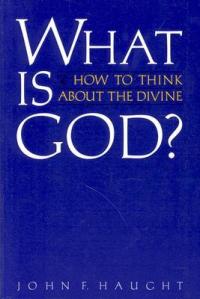 An interesting premise no? Not who is God but what is God?
An interesting premise no? Not who is God but what is God?
John Haught begins immediately to take you from your comfort zone, from the words and phrases we so casually use in reference to God–to the way in which we visualize, speak of and think of God.
He grabs some of the most well-known challenges to God’s existence by today’s latest crop of atheists, and shows why their arguments can be quite shallow. With a turn of a phrase, he also draws atheists into the realm of belief by the very mystery of such terms as beauty and depth. If you can appreciate something as “beautiful” Haught insists, you are dancing with the divine.
In brief, Haught makes out the case that God resides in all the unanswerable questions of life. In those areas where we are nearly incapable of finding words to express our feeling or define our claims, God is.
Thus God is the “event horizon” of the future, the abiding abyss when we examine depth that both invites us forward into a deeper experience while at the same time frightening us with the unknowing of its depth and breadth.
Whether it be the concept of depth, future, freedom, truth, or beauty, we are pulled and yet repelled by each. That which is without boundary, both excites us and frightens us at the same time.
God is the mystery that we seek to understand.
Haught claims that God is perfect self-giving, and out of that perfect offering of self, God remains by choice apart from us, as necessary to full recognition of our right to choose freely our lives.
It is not that Haught proves the existence of God but rather than he makes a good case for the possibility of God and for that being a cogent and rational argument and choice.
He acknowledges that these mystical/mysterious occurrences that we all experience now and again, are either one of two things: either they are simple psycho-biologic responses of chemical interactions or they are bespeak a greater reality that they point to that is their grounding. That point is God.
Along the way, we see religion as the participatory vehicle for delving into this mystery. He describes religion as it should be, rather than what it is, and the picture presented, at least to me, gives credence to my decision to shuck most of the theology and look to the actual ritual as a means and vehicle through which to reach for the divine.
Haught, it seems to me, does well in helping us to identify mystery in our lives as a constant companion, one that is all too often ignored and missed in today’s secularized and busy world. We are too busy explaining stuff to relax in the inability to explain that which is and remains mystery.
And mystery is not just the laundry list of unexplained or should I say yet to be explained. Atheists have made that argument and they are correct in doing so. If God remains in what we do not yet know, then God will forever shrink into a smaller and smaller vessel.
No, here, Haught refers to mystery to those questions that truly have no answer. They are the questions beyond and will remain so. Examples are things like is there any reason to be ethical? Depending on how you define the universe, your answer might be any number of things, none of them are “discoverable” as true or accurate.
Religions, he claims, all boil down to two propositions, our lives are replete with mystery and that mystery is gracious. Everything else is window dressing.
There is a great deal more to this book than these rather simplistic statements. In fact, it is a book full of deep meaning and complicated reasoning. It is not a book to read once and move on. It will become a book you will pick up again and again, and review as it helps point you in a new direction, a mature and thoughtful approach to embracing the mystery of God, and thereby enhancing the meaning of your life.
If you think deeply about metaphysical things, then this book is a guide and support to that journey. Be sure to take advantage of the tips offered.
Read it, more than once.
